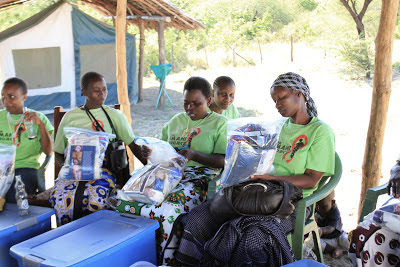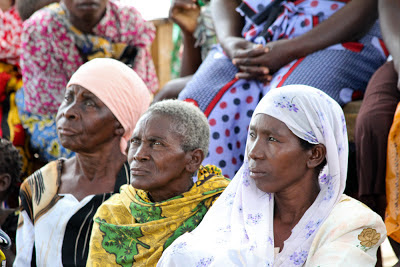After the last day of work, we
always have a party with all of the volunteers.
This gives us a chance to thank the Kenyan volunteers and recognize
their effort, spend fun time together, and say farewell.
The party wasn't until 2:00, so
we had a leisurely morning. A few local
villagers showed up to be seen for pains, coughs, wounds, and other
issues. Ever since we held the clinic in
Sabaki, we have had a slow stream of people coming in the morning and
evening. With only a few days remaining
and a good supply of toys left, we try to give the children a treat in addition
to seeing to their medical needs. It was
punch ball day at the Sabaki Clinic today.
Punch
balls were given to all child patients today
Diane and I had intended to go
for a walk to the river, but we never quite made it. While Marlene went to Malindi to pick up the
pastries for the party and to change some dollars into shillings to give to the
volunteers as a thank you, the rest of us worked on preparations at the
hotel. We sorted the last of the
supplies, separating items to leave at the regional hospital and supplies for
the wound care kits we gave to each of the volunteers. We emptied bins that we
raffled off to lucky Kenyan volunteers and set aside a basket of health care
kits for everyone. We also set out and organized prizes from America for the
volunteers - clothing, jewelry, cosmetics and odds and ends that we were
leaving behind.
A
basket of health care kits for the volunteers
At 2:00, the volunteers arrived
and assembled under the gazebo. After a
welcome from Rodgers as our host, everyone was given the chance to speak to the
group. There were many heartfelt
expressions of gratitude and camaraderie, with good wishes given between the
Americans and Kenyans.
The speaking part of the
program culminated in a speech by Francis in which he thanked the American volunteers
and organization for their care and support of the people in the villages. "Imani" means faith in Swahili, and
Francis said that faith in each other is a guiding principle of the Imani Project in Kenya. He has faith that together we can create opportunities for improving the conditions of his
people. He then praised the Kenyan
volunteers for working without asking to be paid. That teaching and caring for their neighbors
was not a job, but an act of love from the heart, and he was proud to have so
many people willing to give their time to lift up those who need help.
Francis
praises the volunteers for giving their time to help others
Then each volunteer was given a
wound care kit so that they had supplies to help treat people in their villages
with burns or cuts. Many of the
volunteers have become unofficial health care workers in their communities, and
their neighbors come to them for help.
Names were drawn to give away the empty bins, which are highly valued
since plastic storage bins are not available in Kenya. Refreshments of cake and pop were served
while people came one-by-one to choose prizes from the clothing and
jewelry. Henry took charge of the iPod
and Boombox speaker to select music for the festivities.
The
volunteers get their wound care kits
The party ended with a group photo of all of the volunteers together.
Imani
Project volunteers, 2012
After the Kenyans all departed,
the Americans made a final trek to Hippo Camp on the river. No hippos were out, but we had a beautiful
sunset to end the day.
Sunset
over the Sabaki River

.jpg)

















.jpg)


.jpg)





.jpg)


.jpg)








.jpg)
.jpg)
.jpg)
.jpg)

.jpg)
.jpg)

.jpg)

.jpg)